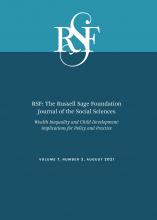Abstract
Wealth inequality is at a historic high in the United States. Yet little is known about the implications of wealth on children’s development because research has focused mainly on the role of wealth in shaping outcomes in adulthood. Using data from the National Longitudinal Survey of Youth (N = 8,095), we examine how family wealth relates to achievement and behavior problems during early childhood, middle childhood, and adolescence. Further, we explore whether links between wealth and children’s development vary by level of income and income volatility. Results show that wealth, controlling for income level and volatility, is uniquely related to both academic and behavioral development in early childhood, middle childhood, and adolescence. Moreover, evidence suggests that wealth plays a buffering role when it comes to protecting children’s development from the deleterious effects of low family income, especially as children grow older.
- © 2021 Russell Sage Foundation. Miller, Portia, Tamara Podvysotska, Laura Betancur, and Elizabeth Votruba-Drzal. 2021. “Wealth and Child Development: Differences in Associations by Family Income and Developmental Stage.” RSF: The Russell Sage Foundation Journal of the Social Sciences 7(3): 152–74. DOI: 10.7758/RSF.2021.7.3.07. Direct correspondence to: Portia Miller at plm11{at}pitt.edu, 521 Learning Research and Development Center, 3939 O’Hara St., Pittsburgh, PA 15213, United States.
Open Access Policy: RSF: The Russell Sage Foundation Journal of the Social Sciences is an open access journal. This article is published under a Creative Commons Attribution-NonCommercial-NoDerivs 3.0 Unported License.






